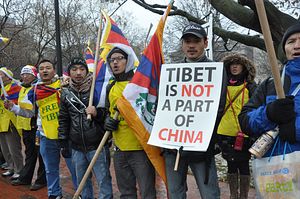Where has the “Free Tibet” rallying call gone? Resistance to the Chinese occupation continues within Tibet, but the visibility of that resistance in the West seems to have declined markedly since the 1990s. This has come even as relations between China and the United States have deteriorated, and as attention to China’s behavior in Xinjiang has drawn greater international criticism. Why has attention dwindled? There are several connected reasons why the volume of the Free Tibet cry has become so muted over the last decade. Altogether, it has much to do with changes in activist networks, as well as coordinated pushback by the Chinese Communist Party.
The visibility of the Free Tibet movement depended upon a few key activists. As Massoud Hayoun points out, while Richard Gere has not renounced his support for Tibet, his attention has shifted to other issues, including HIV research. Similarly, the illness and eventual death of Adam Yauch (MCA of the Beastie Boys) made it more difficult for Free Tibet activists to reach broader audiences through the music community. Moreover, the Dalai Lama himself has decided to adopt a relatively moderate tack towards Beijing in the last decade.
The propaganda reach of the Chinese Communist Party has undoubtedly extended since the 1990s. The CCP has undertaken more effective techniques of fighting back against the Free Tibet movement, including both mass media and social mobilization on Western university campuses. While in the 1990s Free Tibet activists had a relatively free hand in many spaces, Beijing has used money and social mobilization to foreclose some of that rhetorical territory. Violence against Han settlers in 2008 probably contributed to China’s messaging on this question.
The importance of China’s film industry, and of China’s film-watching public, has also substantially increased since the 1990s. China now has the ability to punish actors, directors, studios, producers, and musicians that produce undesirable material. On the margin this can affect decision-making of artists considering speaking out about Tibet, and studios evaluating whether to green light films, albums, books, and TV shows. This has a predictable follow-on effect with the visibility of Tibet in the public eye.
Changes in the relationship between the United States and China may also have led to a relative drop in the visibility of Tibet. Activist networks on foreign policy in the United States, especially on the left, have tended to coalesce around positions antagonistic to established U.S. foreign policy positions. Although the United States government has never regarded Tibet as a particularly high priority, it arguably downplayed Chinese behavior there in the 1980s and 1990s. As relations between Washington and Beijing have grown increasingly strained, activist critiques of China run the risk of becoming an uncomfortable echo of establishment U.S. foreign policy.
Finally, it’s possible that our baseline is wrong, and that the 1990s represent a peak of Tibet activism that was not replicable over the long term. The 1990s saw, for example, two major film productions that called attention to China’s activities in Tibet — Kundun by Martin Scorcese, and Seven Years in Tibet, featuring Brad Pitt. For a separatist movement that does not involve a large, transnational diaspora network and that lacks access to large-scale capital, the 1990s may have been the high water mark, rather than a sustainable level of activism.
Much of this may change. We can expect an explosion of interest in Tibet when the current Dalai Lama, now 83, passes away. The growing tension between Washington and Beijing, and perhaps especially between Beijing and New Delhi, may offer Tibet separatists the kind of great power sponsorship that they haven’t enjoyed in some time. There is still time, and opportunity, for Tibet activists to recapture global attention.

































